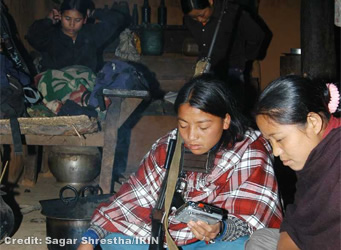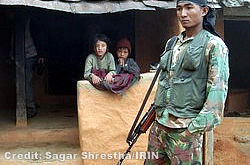When the clock strikes four in the morning, Lambu Lama and his family rush out of their home in a Maoist stronghold of Nepal. Rebels use the storeroom at the back of Lama's house to clean and repair small arms and construct bombs. During the day, the orchards around his hilltop house echo to the sound of rifles cracking, as new recruits are initiated in the use of weapons.
For many villagers like the Lama family, living in a Maoist-controlled community is fraught with difficulty. The rebels ensure that the village in question has no contact with the outside world. As a result, most residents here have never met a government official, a state teacher, nurse, development worker or a foreigner. "Not that we saw many government people before [the rebellion]," Lama noted. Movement is severely restricted. Leaving the village without a permit from the local rebel chief, is punishable by death. Many people who fall sick are forced to leave clandestinely to seek treatment in towns. They never return, fearing retribution. The rebels reciprocate to some extent. Between their armed operations and their drill, they help villagers graze animals, clean houses and till the rice farms. The poorest villagers are sympathetic towards the rebels, harbouring the hope that one day they help will bring rural development and provide economic opportunities. There have been improvements for some under the rebels. Some villagers told IRIN there was now less exploitation and intimidation by absentee landlords, or those from higher castes. In many areas, the rebels have banned the traditional exploitative system of Bali Pratha through which the Dalits - the lowest caste - had to be labourers for the higher caste, and were only paid with a few lentils and crops once a year for all their work. "Now I can make money for every effort I make," said 32-year-old tailor Tara Pariyar. On the other hand, local communities in rebel areas have to pay tax on every item they trade in and produce, in other words, on almost every form of income. "This [tax] can be a real burden on us, we are so poor," one local farmer said. Most of the children in Chisapani were born during the rebellion and know no other life. "Every family has to follow every rule of the Maoists. Life is very difficult but we have managed to survive. What choice do we have anyway?" asked Prahlad Basnet, another man from Chisapani. He appeared completely worn out and said he felt life for many had got worse since the Maoists came to stay. "We have less to eat and have to work very hard to get a square meal," he explained. Children in the Maoist-controlled village do not bat an eyelid when female and male militants walk around, machine guns on their shoulders and strings of hand grenades tied on their belts. The children gaze disinterestedly as Maoist militants parade and exercise twice a day. "All we want is peace and this war should end. For how long should children and parents watch each other die?" asked 70 year-old Ramesh Pariyar. According to those who live in Chisapani, relations with the 200-odd insurgents who live around the village are as good as they are mainly because, unlike in other regions, children have not yet been forced to join the Maoist military. The rebels are involve the community however in other ways, having made it compulsory for every family to guard sentry posts to watch out for the security force patrols. "We have to stand guard the whole day and night watching over the hills, and to constantly update the Maoists about any movement," complained Lama, who feels that this is a very risky task as they could be fired if the army attacked. "After we get killed, the government will report that we were terrorists killed by the security forces," he added. Copyright © UN Office for the Coordination of Humanitarian Affairs 2006 [ This report does not necessarily reflect the views of the United Nations] Integrated Regional Information Networks (IRIN), part of the UN Office for the Coordination of Humanitarian Affairs (OCHA).
|





